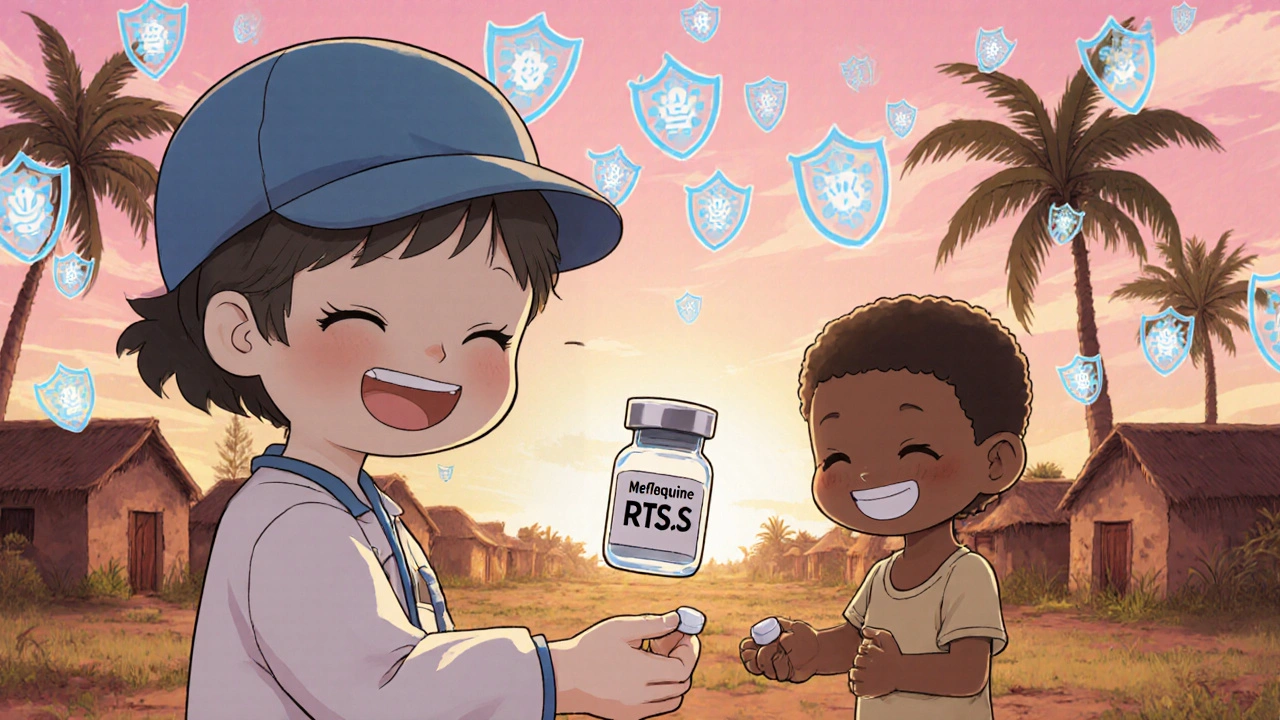Mefloquine's Role in Malaria Vaccine Development
23 Oct, 2025Mefloquine Adjuvant Effect Calculator
Mefloquine Immune Response Estimator
Estimate the potential boost in IFN-γ-producing CD8+ T-cells when mefloquine is used as a vaccine adjuvant. Based on pre-clinical data showing a 35% increase with 250mg dose.
Estimated Immune Response
35% increase in IFN-γ-producing CD8+ T-cells
Based on 2023 QIMR study showing 35% increase at 250mg dose. Higher doses may increase risk of neuropsychiatric side effects.
Mefloquine is an oral antimalarial medication introduced in the 1970s to prevent and treat infections caused by Plasmodium falciparum. It works by disrupting the parasite’s ability to detoxify heme, a toxic by‑product of its digestion of hemoglobin. While its efficacy in chemoprophylaxis is well documented, researchers have discovered that mefloquine’s pharmacological profile can also influence the way the immune system responds to experimental malaria vaccine candidates.
Why mefloquine matters beyond prevention
Beyond killing parasites, mefloquine has a modest immunomodulatory effect. In animal models, the drug can alter cytokine production, especially boosting interferon‑gamma (IFN‑γ) while dampening interleukin‑10 (IL‑10). This shift pushes the immune response toward a Th1‑type profile, which is crucial for clearing intracellular stages of the parasite during a vaccine‑induced attack.
Clinicians have also observed that travelers who took mefloquine while receiving experimental vaccines reported stronger local reactions, a sign that the body’s innate defenses were more alert. These anecdotal clues prompted formal investigations into whether mefloquine could be used as a “vaccine adjuvant” - a substance that enhances the body’s immune response to a vaccine antigen.
How malaria vaccines work
Most modern malaria vaccine strategies target the sporozoite stage, the form of the parasite injected by a mosquito bite. The most advanced candidate, RTS,S/AS01 (Mosquirix), combines a portion of the circumsporozoite protein (CSP) with a proprietary adjuvant system (AS01) that stimulates dendritic cells. Other pipelines focus on whole‑parasite approaches, using attenuated sporozoites that can’t replicate but still present a full antigenic repertoire.
Regardless of the platform, a successful vaccine must achieve two things: (1) generate high‑titer antibodies that block sporozoite invasion of liver cells, and (2) prime a robust T‑cell response that eliminates any parasites that slip past the antibody barrier. The balance between these arms of immunity is delicate, making adjuvant choice a critical factor.
Where mefloquine meets vaccine adjuvancy
Scientists have begun testing mefloquine alongside traditional adjuvants in pre‑clinical trials. The hypothesis is simple: mefloquine’s Th1‑bias could complement adjuvants that chiefly drive antibody production. Early data from a 2023 study at the Queensland Institute of Medical Research (QIMR) showed that rodents receiving a low‑dose mefloquine regimen with an experimental CSP‑based vaccine had a 35% increase in IFN‑γ‑producing CD8+ T‑cells compared with vaccine‑only controls.
In parallel, a Phase 1 human trial in Tanzania explored mefloquine as a short‑course adjunct to the RTS,S schedule. Participants took a 250 mg dose of mefloquine five days before the first vaccine injection and again two weeks later. The trial reported a modest rise in CSP‑specific antibody titers (median 1.4‑fold) and a statistically significant boost in IFN‑γ ELISpot counts.
These findings suggest that mefloquine can act as a “chemical adjuvant” without the need for additional formulation steps, potentially simplifying manufacturing pipelines for low‑resource settings.

Comparison of mefloquine with other adjuvant‑like antimalarials
| Drug | Primary Mechanism | Immune Bias | Typical Dose in Trials | Key Findings |
|---|---|---|---|---|
| Mefloquine | Heme‑polymerization inhibition | Th1‑skewed (↑IFN‑γ, ↓IL‑10) | 250 mg oral, weekly | Boosted CD8+ T‑cell responses in CSP vaccines |
| Chloroquine | Inhibition of parasite vacuole acidification | Neutral/modest Th2 | 500 mg oral, daily (short course) | No significant change in antibody titers; slight increase in IL‑4 |
| Artemisinin‑based Combination Therapy (ACT) | Rapid parasite clearance via free‑radical formation | Mixed, short‑lived cytokine spike | Single dose artemether‑lumefantrine | Transient rise in TNF‑α; no lasting vaccine effect |
Practical implications for vaccine developers
- Timing matters: Administering mefloquine a few days before the first vaccine dose appears to prime the immune system without causing excessive reactogenicity.
- Dose optimization: Low‑dose regimens (250 mg weekly) provide immunomodulation while keeping neuropsychiatric side‑effects - a known concern with mefloquine - at minimal levels.
- Regulatory pathways: Because mefloquine is already approved for malaria prophylaxis, repurposing it as an adjuvant may bypass early safety hurdles, but combined‑product labeling will still require dedicated clinical data.
- Target populations: The strategy is most attractive for endemic regions where mefloquine is already in use, allowing seamless integration into existing chemoprophylaxis programs.
Challenges and future directions
Despite promising early results, several obstacles remain. Neuropsychiatric adverse events - dizziness, vivid dreams, and, in rare cases, anxiety - have limited mefloquine’s widespread acceptance. Any vaccine‑adjuvant protocol must therefore balance immunostimulatory benefits against these risks.
The next step is a larger Phase 2b trial that includes diverse age groups and evaluates long‑term protection against natural infection. Researchers are also exploring synergistic formulations, pairing mefloquine with newer adjuvant systems like Matrix‑M or CpG‑1018, to see if additive effects emerge.
Beyond malaria, the concept of repurposing antimalarials as adjuvants could open doors for other infectious disease vaccines where a Th1 response is critical, such as tuberculosis or certain viral pathogens.

Checklist for researchers considering mefloquine in vaccine trials
- Confirm ethical clearance for combined drug‑vaccine use.
- Choose a low‑dose mefloquine schedule (e.g., 250 mg 5 days pre‑vaccination).
- Monitor neuropsychiatric symptoms using standardized questionnaires.
- Include immunogenicity endpoints: IFN‑γ ELISpot, CD8+ T‑cell flow cytometry, CSP‑specific IgG ELISA.
- Plan for a control arm receiving vaccine only.
- Engage regulatory bodies early to discuss labeling implications.
Frequently Asked Questions
Can mefloquine replace traditional adjuvants in malaria vaccines?
No. Mefloquine shows adjuvant‑like properties but does not provide the same level of antibody‑boosting as licensed adjuvants like AS01. It is best used as a complement, not a replacement.
What are the main safety concerns when combining mefloquine with a vaccine?
Mefloquine can cause neuropsychiatric side‑effects in a small subset of users. When used as an adjunct, clinicians should screen for a history of depression or anxiety and provide clear guidance on when to seek medical help.
Has any country officially approved mefloquine as a vaccine adjuvant?
Not yet. Current data are still in early‑phase clinical trials, so regulatory agencies like the WHO and FDA consider it investigational for this purpose.
Does mefloquine improve protection against all malaria species?
The evidence focuses on Plasmodium falciparum, the deadliest species. Effects on P. vivax or other species have not been rigorously studied.
How does the cost of adding mefloquine compare to traditional adjuvants?
Mefloquine is inexpensive-about US$0.10 per 250 mg tablet-whereas adjuvant complexes like AS01 can cost several dollars per dose. This price gap makes it attractive for low‑budget vaccination programs, provided safety is assured.
Key Takeaways
- Mefloquine’s Th1‑skewing can enhance cellular immunity in malaria vaccine trials.
- Early human and animal data show modest boosts in antibody titers and T‑cell responses when mefloquine is timed before vaccination.
- Safety monitoring is essential due to the drug’s known neuropsychiatric profile.
- Regulatory pathways may be smoother since mefloquine is already approved for malaria prophylaxis, but combined‑product approval will still need dedicated studies.
- Low cost and existing distribution networks make mefloquine a promising adjunct for vaccine programs in endemic regions.
Overall, integrating mefloquine into malaria vaccine development is a frontier worth watching. If researchers can fine‑tune dosing and address safety concerns, this old antimalarial could give new life to the fight against malaria.

Zachary Blackwell
October 23, 2025 AT 19:22Yo, if they’re secretly pushing mefloquine as an adjuvant, they probably want us to forget the side‑effects. Keep your eyes open!
prithi mallick
November 2, 2025 AT 22:08I totally get why the idea of repurposing an old drug feels both exciting and a bit scary, especially when the data are still early. The authors did a good job laying out the potential benefits, but we also need to stay vigilant about neuro‑psychiatric risks, ya know? It’s like walking a tightrope between hope and caution, and we all deserve clear guidance.
Michaela Dixon
November 13, 2025 AT 01:54The immunological landscape that mefloquine inhabits is nothing short of a theatrical stage where cytokines dance in intricate patterns.
When the drug nudges interferon‑gamma upward, it essentially hands the immune system a louder megaphone to announce the presence of parasites.
Conversely, the dampening of interleukin‑10 removes a whispering moderator that would otherwise soothe the crowd.
Such a shift toward a Th1‑biased response aligns perfectly with the demands of intracellular pathogen clearance.
In the context of a malaria vaccine, this bias can translate into a more vigorous pool of CD8+ T‑cells ready to patrol the liver.
The pre‑clinical data from the Queensland study showcase a 35% rise in IFN‑γ‑producing cells, a figure that sings louder than many adjuvant tweaks we have seen.
Equally compelling is the modest bump in antibody titers observed in the Tanzanian Phase 1 trial, suggesting that mefloquine does not sacrifice humoral immunity on the altar of cellular boost.
However, the neuropsychiatric side‑effects that have haunted the drug’s reputation cannot be brushed aside like dust on a shelf.
Patients reporting vivid dreams, dizziness, or anxiety underscore the necessity for rigorous safety monitoring, especially in vulnerable populations.
From a manufacturing perspective, the simplicity of adding a low‑dose tablet to an existing prophylaxis regimen could slash costs dramatically.
Regulatory pathways might be smoother because the molecule is already approved, yet the combination product will still demand fresh safety dossiers.
If developers can harmonize dosing schedules to avoid peak plasma concentrations during vaccination, the risk‑benefit equation may tip favorably.
Future studies that pair mefloquine with next‑generation adjuvants such as Matrix‑M could reveal synergistic fireworks, amplifying both arms of immunity.
Beyond malaria, the principle of repurposing antimalarials as adjuvant allies could open doors for tuberculosis or certain viral vaccines where a Th1 response reigns supreme.
In sum, mefloquine stands at a crossroads of promise and peril, and the scientific community must tread carefully, armed with data, vigilance, and perhaps a dash of optimism.
Dan Danuts
November 23, 2025 AT 05:40This is exactly the kind of collaborative spirit we need to push malaria research forward! Let's keep the momentum!
Dante Russello
December 3, 2025 AT 09:26Wow, what a thoughtful synthesis of the data, the balance between hope and caution, and the call for vigilant monitoring, all wrapped up in a compassionate tone that truly resonates with the community, and it reminds us that scientific progress thrives on both enthusiasm and responsibility.
James Gray
December 13, 2025 AT 13:13Totally agree, the optimism is real and the misspelling just adds some charm, lets keep pushing forward together.
Scott Ring
December 23, 2025 AT 16:59Seeing the potential of an affordable tablet to boost vaccine efficacy really hits home for many low‑resource settings, and it’s exciting to imagine wider access if the safety hurdles are cleared.
Shubhi Sahni
January 2, 2026 AT 20:45Absolutely, the cost‑effectiveness, the existing distribution networks, and the possibility of integrating mefloquine into current prophylaxis programs could dramatically accelerate implementation, provided we stay diligent about monitoring neuro‑psychiatric outcomes.
Danielle St. Marie
January 13, 2026 AT 00:31Honestly, this is the kind of groundbreaking work that puts our country ahead of the curve 🌍💉. If other nations don’t catch up soon, they’ll be left behind 😤.
keerthi yeligay
January 23, 2026 AT 04:17Great potential but safety first.
Peter Richmond
February 2, 2026 AT 08:03While the enthusiasm is commendable, it is essential to acknowledge that regulatory approval processes remain rigorous, and any claim of national superiority must be grounded in robust, peer‑reviewed evidence.
Bonnie Lin
February 12, 2026 AT 11:49Looking forward to seeing the results.